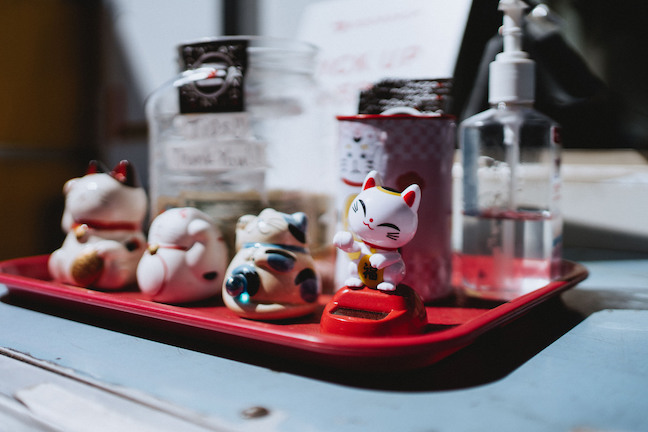Food carts and restaurants on Portland State’s campus are facing a new array of challenges serving food during the COVID-19 pandemic. In the wake of Governor Brown’s stay-at-home order, businesses must grapple with reduced clientele, lackluster government relief and delivery services that charge hefty commissions.
“Before the stay-at-home order, when they cancelled classes, it cut the cart’s sales by about 85%,” said Robert Grant, an employee at The Local Grind, a popular food cart with two locations near PSU’s campus. “By the last day before the stay-at-home order, it was about 5% of normal sales.”
The Local Grind, which normally operates its popular cart outside of the Simon Benson House off of SW Montgomery Street, was forced to close on the first day of the stay-at-home order. “Our permits don’t allow us to stay open because we’re not on a private property,” Grant said. “We’re operating on public space.” Both carts stopped serving from the sidewalk on March 23.
The Local Grind was by no means the only food cart struggling with the new situation. On the other side of campus, the owners of Tokyo Sando were making their own calculations.
“We had just opened in the beginning of February, but had already been getting really busy at lunch time for our nearby office workers, as well as PSU students,” explained Andrea Nakajima, owner of the Tokyo Sando food cart alongside her husband Taiki Nakajima. “We were thinking we might have to close the food cart. After the stay-at-home order came out, we set up our delivery and pickup options for customers to hopefully meet their needs.”

Opting in to delivery apps such as DoorDash and Grubhub presented new challenges for both Tokyo Sando and The Local Grind. “They showed us all these charts about how much they could increase our revenue, I think they said by 40% percent,” Taiki Nakajima said. In reality, both businesses dealt with steep commissions and inflexible promotion guidelines from the delivery services.
“With the way the delivery services work, if you have any kind of promotion on that, you end up losing money on the orders,” Grant said. “The amount that it’s costing just to be open is not paying for the delivery.”
The Nakajimas expressed similar concerns. Taiki Nakajima said DoorDash might take as much as 30% of an order as commission, before promotions. “They don’t factor in the cost of running my business, they only think about their cut.”
“I think it’s really sick that they’re doing this,” Grant said. “Right now, they’re making [money] hand over fist. There’s nothing wrong with making money, but to take it out on the people who are not is wrong.”
The full scale of the effect of the coronavirus pandemic on restaurants in the Portland area remains unknown. The Oregon Employment Department saw 56,646 unique unemployment claims in the week of April 4, roughly three times the rate at the peak of the Great Recession. Specific data on furloughed and laid-off restaurant employees in Oregon does not yet exist.
Restaurant analysts estimate as much as 75% of all independent restaurants in the United States may close permanently as a result of the pandemic. The result would be a homogenous restaurant landscape populated primarily by large restaurant groups and chains.
Grant is aware of the odds. “If [the stay-at-home order] lasts through July and there’s no funding coming in, then the business would fold. That’s just undoable. At best, I don’t know what the summer session looks like, but all the revenue for the remainder of the [spring] session is gone.”
Many businesses hoped to receive support from the federal, state or city governments, but availability has been spotty at best. Prosper Portland, a development corporation created by the city government, assembled $1.38 million in grants and $1 million in loans to distribute to affected Portland businesses, but many fear it’s not enough.
Nick Zukin, owner of Chinatown restaurant Mi Mero Mole and former owner of recent downtown closure Zapapizza, voiced his concerns with the relief program on Twitter on April 7. “Over 10,000 of us rejected for @prosperportland grants. Only 2% got money. Will be interested to see who were the chosen ones. Might have been better off if they distributed a million lottery tickets.”
Grant voiced similar concerns about the Payroll Protection Program, a $349 billion relief program passed by Congress to loan money to small businesses to maintain staffing during the pandemic. “We were planning on a PPP loan, but nothing is materializing. Everybody is laid off until we can get some kind of payroll compensation or until we can pay for that [ourselves],” Grant said.
The loan program is far from foolproof. Many business owners across the country question whether the $349 billion will be enough to make a difference. Paul Stevens, owner of the Night Light Lounge, a popular restaurant and bar in Southeast Portland, wrote in a guest editorial for the Portland Mercury the program fails to meet the needs of the restaurant industry.
“Essentially, I will be paying back a loan that is two-and-a-half times our monthly payroll, with a two-year term, to pay employees who I am putting at risk and who I don’t have work for,” Stevens said.
DoorDash announced a slight relief to businesses on Friday, April 10, reducing their commission fee by 50% for local partners. The move did not draw Grant to revoke his criticism. “This is three weeks overdue. I hope the backlash they receive is massive.”






